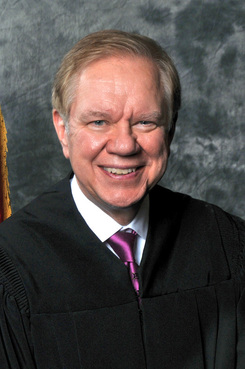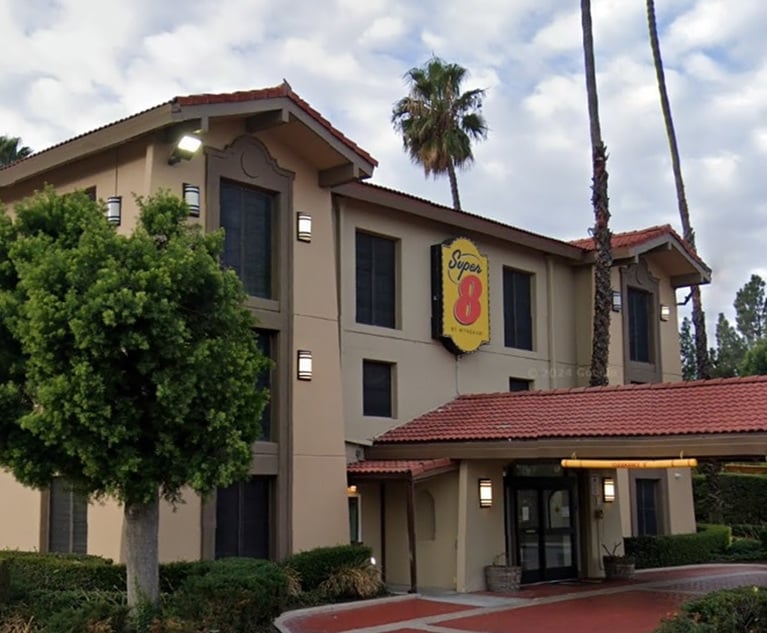Third Circuit Says Prolonging Traffic Stop Made Gun and Joint Inadmissible
The Third Circuit in a precedential decision denied the prosecution's appeal of a ruling below that evidence obtained by Edison Township police officer Daniel Bradley from defendant Theodore “Tyrone” Clark during the 23-minute stop could not be used against him.
August 30, 2018 at 03:20 PM
3 minute read
 Judge Thomas Ambro.
Judge Thomas Ambro.
Because a New Jersey policeman prolonged a traffic stop past the point of its intended purpose, a firearm and marijuana cigarette found on a passenger is inadmissible as evidence.
The U.S. Court of Appeals for the Third Circuit in a precedential decision denied the prosecution's appeal of a ruling below that evidence obtained by Edison Township police officer Daniel Bradley from defendant Theodore “Tyrone” Clark during the 23-minute stop could not be used against him.
Clark was traveling with driver Donald Roberts in Clark's van. Bradley pulled Roberts over for driving at night without headlights and for using a phone while driving, Third Circuit Judge Thomas Ambro said in the Aug. 30 decision.
Bradley interrogated Roberts as to where he drove from, the vehicle registration, and whether he had any outstanding warrants. Roberts claimed the van belonged to his mother, and that he was traveling from her house.
Bradley separated Roberts and Clark, then switched and asked Roberts how long he had known the other man, to which he replied, not long. In an attempt to test the veracity of Roberts' story, Bradley asked Clark the same question and received a different answer: that the two had been friends for a long time, according to the court.
Upon another round of questioning, Roberts denied lying, so Bradley went back to Clark and asked him to step out of the vehicle after detecting a strong marijuana odor, Ambro wrote. A pat-down of Clark produced a joint and .357 caliber handgun, and Clark was taken into custody, while Roberts was allowed to leave with a summons for traffic violations, according to the decision.
Subsequently, Clark filed a motion to suppress the evidence obtained during the traffic stop, claiming Bradley improperly extended the encounter past its purpose.
Ambro explained that the legal purpose of a traffic stop is to address the traffic violation that warranted the stop and see to any related safety concerns—which can extend to checking the driver's record for any outstanding warrants—but to go no further than ensuring roadway safety.
“We agree with the district court that, given the information confronting Bradley when he confirmed through the computerized check that Roberts was authorized to drive the vehicle, and when there was no fact calling that authority into doubt, Bradley no longer could have reasonably questioned it,” Ambro said. “Bradley's inquiry into Roberts' criminal history was thus not tied to the traffic stop's mission, and, at that point, 'tasks tied to the traffic infraction … reasonably should have been … completed.'”
Assistant U.S. Attorney Norman Gross declined to comment.
Clark's attorney, Lisa Van Hoeck of the Federal Public Defender's Office, did not respond to a request for comment.
This content has been archived. It is available through our partners, LexisNexis® and Bloomberg Law.
To view this content, please continue to their sites.
Not a Lexis Subscriber?
Subscribe Now
Not a Bloomberg Law Subscriber?
Subscribe Now
NOT FOR REPRINT
© 2025 ALM Global, LLC, All Rights Reserved. Request academic re-use from www.copyright.com. All other uses, submit a request to [email protected]. For more information visit Asset & Logo Licensing.
You Might Like
View All

Trending Stories
- 1Troutman Pepper, Claiming Ex-Associate's Firing Was Performance Related, Seeks Summary Judgment in Discrimination Suit
- 2Law Firm Fails to Get Punitive Damages From Ex-Client
- 3Over 700 Residents Near 2023 Derailment Sue Norfolk for More Damages
- 4Decision of the Day: Judge Sanctions Attorney for 'Frivolously' Claiming All Nine Personal Injury Categories in Motor Vehicle Case
- 5Second Judge Blocks Trump Federal Funding Freeze
Who Got The Work
J. Brugh Lower of Gibbons has entered an appearance for industrial equipment supplier Devco Corporation in a pending trademark infringement lawsuit. The suit, accusing the defendant of selling knock-off Graco products, was filed Dec. 18 in New Jersey District Court by Rivkin Radler on behalf of Graco Inc. and Graco Minnesota. The case, assigned to U.S. District Judge Zahid N. Quraishi, is 3:24-cv-11294, Graco Inc. et al v. Devco Corporation.
Who Got The Work
Rebecca Maller-Stein and Kent A. Yalowitz of Arnold & Porter Kaye Scholer have entered their appearances for Hanaco Venture Capital and its executives, Lior Prosor and David Frankel, in a pending securities lawsuit. The action, filed on Dec. 24 in New York Southern District Court by Zell, Aron & Co. on behalf of Goldeneye Advisors, accuses the defendants of negligently and fraudulently managing the plaintiff's $1 million investment. The case, assigned to U.S. District Judge Vernon S. Broderick, is 1:24-cv-09918, Goldeneye Advisors, LLC v. Hanaco Venture Capital, Ltd. et al.
Who Got The Work
Attorneys from A&O Shearman has stepped in as defense counsel for Toronto-Dominion Bank and other defendants in a pending securities class action. The suit, filed Dec. 11 in New York Southern District Court by Bleichmar Fonti & Auld, accuses the defendants of concealing the bank's 'pervasive' deficiencies in regards to its compliance with the Bank Secrecy Act and the quality of its anti-money laundering controls. The case, assigned to U.S. District Judge Arun Subramanian, is 1:24-cv-09445, Gonzalez v. The Toronto-Dominion Bank et al.
Who Got The Work
Crown Castle International, a Pennsylvania company providing shared communications infrastructure, has turned to Luke D. Wolf of Gordon Rees Scully Mansukhani to fend off a pending breach-of-contract lawsuit. The court action, filed Nov. 25 in Michigan Eastern District Court by Hooper Hathaway PC on behalf of The Town Residences LLC, accuses Crown Castle of failing to transfer approximately $30,000 in utility payments from T-Mobile in breach of a roof-top lease and assignment agreement. The case, assigned to U.S. District Judge Susan K. Declercq, is 2:24-cv-13131, The Town Residences LLC v. T-Mobile US, Inc. et al.
Who Got The Work
Wilfred P. Coronato and Daniel M. Schwartz of McCarter & English have stepped in as defense counsel to Electrolux Home Products Inc. in a pending product liability lawsuit. The court action, filed Nov. 26 in New York Eastern District Court by Poulos Lopiccolo PC and Nagel Rice LLP on behalf of David Stern, alleges that the defendant's refrigerators’ drawers and shelving repeatedly break and fall apart within months after purchase. The case, assigned to U.S. District Judge Joan M. Azrack, is 2:24-cv-08204, Stern v. Electrolux Home Products, Inc.
Featured Firms
Law Offices of Gary Martin Hays & Associates, P.C.
(470) 294-1674
Law Offices of Mark E. Salomone
(857) 444-6468
Smith & Hassler
(713) 739-1250








